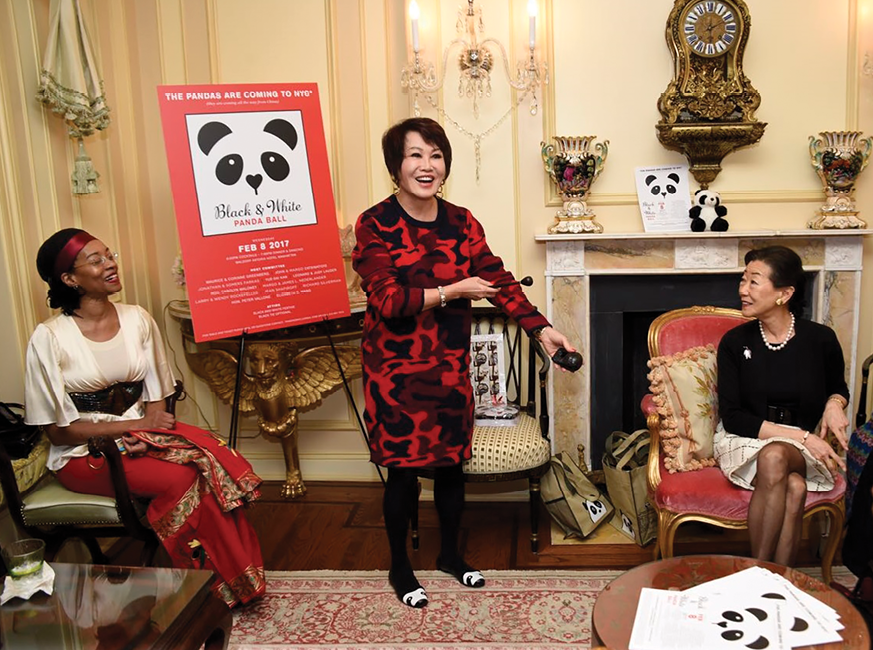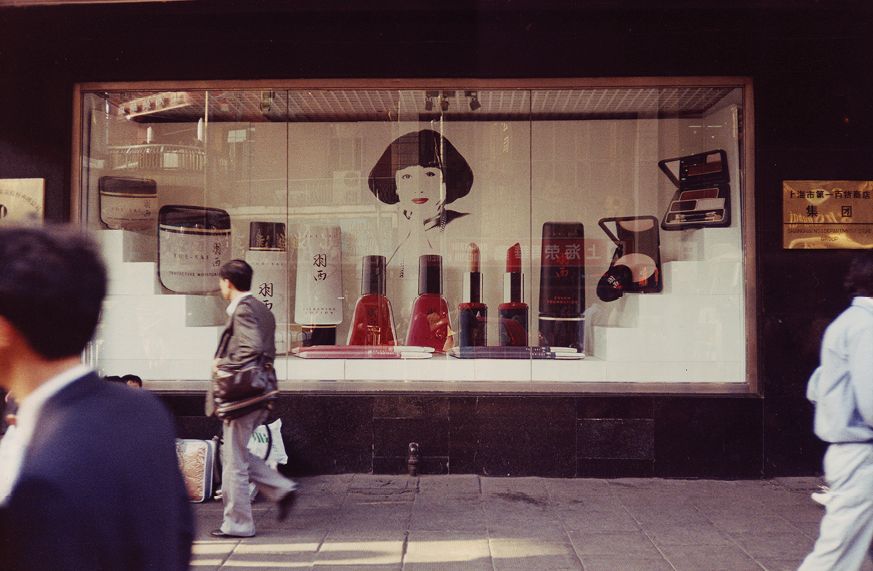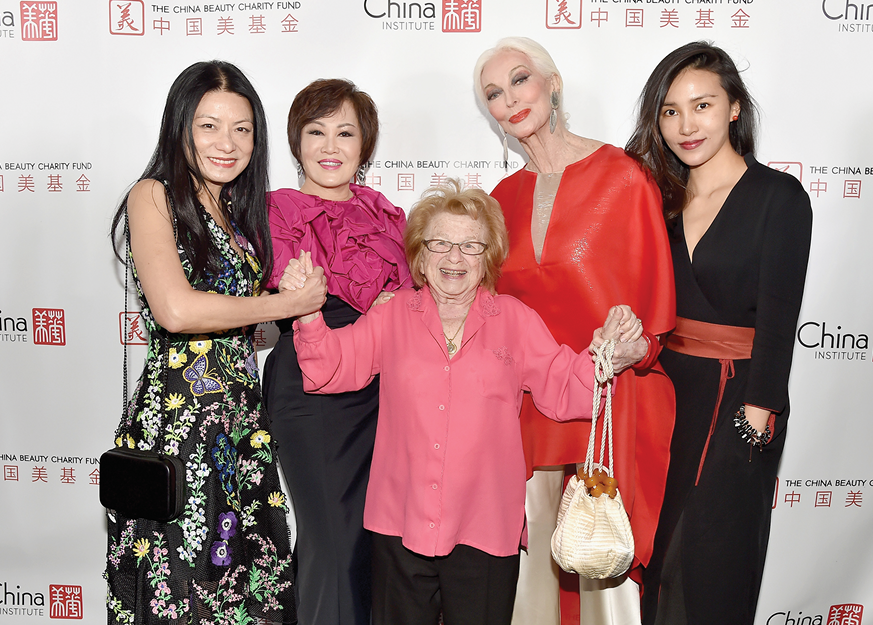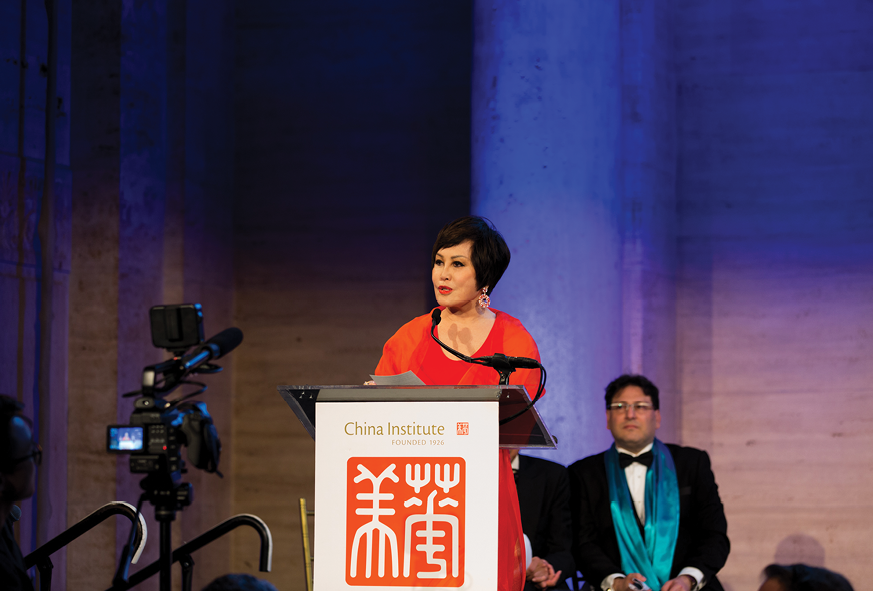- Home
- Media Kit
- Current Issue
- Past Issues
- Ad Specs-Submission
- Ad Print Settings
- Reprints (PDF)
- Photo Specifications (PDF)
- Contact Us


![]()
ONLINE

Positive Energy
Editors' Note
Chinese-American Yue-Sai Kan (yuesaikan.com) is an Emmy-winning television producer, best-selling author, entrepreneur, and humanitarian. In 1972, Yue-Sai created the weekly television series Looking East, the first of its kind to introduce Asian cultures and customs to a growing and receptive American audience. In 1986, the television series One World, produced and hosted by Yue-Sai, aired on China’s national television network CCTV, giving millions of Chinese the first glimpse of the outside world. In 1992, she successfully transformed herself from a TV personality to an entrepreneur by creating the Yue-Sai Cosmetics brand, which is recognized by over 90 percent of the Chinese population today. She also created a lifestyle product line called House of Yue-Sai, which focuses on interior design and home furnishings. Yue-Sai has written nine best-selling books, spreading the knowledge of beauty, etiquette, health and success among Chinese readers.
Yue-Sai’s humanitarian efforts have primarily been focused on education and children. She has built schools in her hometown of Guangxi and libraries in poor regions in Northern China. She awarded scholarships to students in a number of colleges in China as well as Hunter College and the Fashion Institute of Technology in New York. As a board member of the Shanghai Soong Ching Ling Foundation, she has helped raise millions of dollars for the well-being of women and children. Six years ago, Yue-Sai signed on to be the National Director of the Miss Universe China pageant, which seeks to encourage young people in particular to be charitable, educate them about exemplary values, and create a positive image and celebrate women by empowering them to use beauty for positive social change. Yue-Sai also sits on the board of the Ellis Island Honors Society, Committee of 100, China Institute in America, and Prince Albert of Monaco’s Philanthropy Roundtable. Yue-Sai Kan is the first and only living American featured on a Chinese postage stamp.

Yue-Sai Kan supporting efforts to bring two pandas from China to New York
How do you define your areas of focus today and what are you most excited about doing?
I’m excited about doing things I haven’t done before. There will always be things I engage a lot in, like charities. I founded the China Fashion Gala and am growing it to be the biggest platform to showcase all of the top Chinese fashion brands in the country, and every year we hold a huge event in New York dedicated to it. I’m also involved in several other endeavors.
One of the things we’re trying to do right now is to bring two pandas to New York from China, so we are working with the Chinese government and the New York City government. These projects are ongoing.
My publisher just asked me to republish two books, The Chinese Ladies and The Chinese Gentleman. They want them to be updated so they’re more current. They also want me to do a book titled How to Live Beautifully After 50.
I’ve been told that I’m the first person to do what they call “The Belt and Road Initiative.” My first TV series was set up to help people in the U.S. understand Asia. My second show was the PBS coverage of the 35th Anniversary of the People’s Republic of China. That was the first joint venture between China and the U.S. in terms of public broadcast programming.

A cosmetics display window in the most promiment departments store
in Shanghai in the early 1990s
All of this has to do with the policy of the Chinese government, and how they want to open the country up. It’s all linked.
Even when I created my cosmetics line, it was on the advice of the Vice Premier of China. He asked me to come back to China to do business, which is where I started Yue-Sai Cosmetics.
I’ve always been a part of this overall opening of China, even in terms of charity. The word “philanthropy” was not in the vocabulary of the Chinese people. They never really had charity. In the old days, they felt that the Communist government was there to take care of the people from cradle to grave.
I remember, even as late as the 1980s, when people talked about giving money to charity, it was seen as a joke.
The first donation we gave to China was in 1995, with the United Nations Women’s Conference in Beijing. That was how charity began in China.
Even then, after we gave $1.5 million, the Chinese government said we needed to pay tax on it. Subsequently, taxes have gone up to where it’s now 12 percent. The idea is that if one makes $1 million in China every year, one can deduct up to 12 percent of their profit.
We don’t necessarily have the most money to give, but our idea has always been ahead of anyone else.

Yue-Sai Kan with other guests on the red carpet
of a China fashion gala in New York
The one project I have never gotten involved in, even though I’ve been asked to do it a million times, is writing my biography.
Recently, many people have come to talk to me about doing a television series about my life. They say it’s because I have so much positive energy and have contributed so much to the opening of China.
This means I’m going to have a lot of work to do because they want me to start taping groups of stories, like what happened when the Chinese Minster of Culture asked me to write a book on etiquette and the story behind that, for instance. It will be something like 80 percent reenactment with actors and actresses,10 percent of me linking in and 10 percent archival footage.
This is challenging and truly interesting to me. I have had many documentaries made about me, but to reenact my life would be different.
I haven’t written a biography because I don’t think of myself like this, but they point out how with all I have done, why would I not want a record of it that could be inspiring to others. They call it positive energy.
Did you know early on that your cosmetics line would work?
No, but I knew, since I was given free access on the national television network, that it was a good thing, because that was shocking at the time. This was when there was only six hours of TV per day and the TV hosts were very professional looking.
If the government’s policy is to let the Chinese understand more about the outside world through the use of television, there is no question that a door is going to open, and it will continue to open wider and wider.
I decided to work on a cosmetics line because I felt that, as China opened up, trends would mirror the U.S., and I was right. Today, Chinese kids buy cosmetics just like American kids. The open door policy allows China to really be part of the world.
In the early days, it was really hard. I knew that I had the blessing to do this, but what I didn’t realize was how much people might object to my ideas.

Yue-Sai Kan at the China Institute Blue Cloud Gala
I would give a lecture at Beijing University and the school would be split after I left. Half the students said they should be more modern. The other side said they wanted things to remain the same. It was an interesting debate to be a part of.
Overall, with what I’ve done, I’ve been able to influence generations of Chinese people, as I’ve written nine books. Someone even said that I influenced their children because I’ve had Chinese dolls made after my image.
When the cosmetics company was sold, was it difficult for you to part with it?
At that time, Vidal Sassoon was still alive. He told me that if I considered the company still mine after selling it, then I should reconsider selling it. He was right, because things were done to my business that I didn’t necessarily like, but I had to realize it was no longer mine and I had to get used to it.
It wasn’t so much a void for me because I was so busy. I was doing so many things. If I ever see something I don’t like, I have to think back to what Mr. Sassoon said and thank him for teaching me something about selling a company I built from scratch.
I also didn’t have to focus strictly on the cosmetics. I could do many other things.
How did the relationship develop with Miss China?
I got involved with Miss Universe because they needed a national director and China never had a good one. They needed someone they could communicate with smoothly.
There are a lot of requirements of Miss China and Miss Universe. She has to be articulate and a good-looking girl with a good body, and the personality has to be right. After all this time, the Chinese really do have a serious deficit in some areas. A girl in her 20s has such limited exposure to the West compared to a girl of the same age in Korea. It’s totally different. The Chinese girls do not get exposed to what we call international popular culture. They are limited to what is available to them in their language in China. For most of them, their English is not as good as it should be.
.png)
Yue-Sai Kan at the Ban Ki-Moon Award ceremony
There are also many Chinese girls who aren’t sure about their style because their parents don’t bring them up in that culture. Therefore, when we train them, it’s from A to Z. It can be very difficult.
What is important to me is that, when we do a Miss Universe China Final, we add a charity component. We make $1.5 million from the event and then we give it to Smile Train, an organization that works with children who have cleft palates. We use beauty to do something wonderful.
Even though charity is very new to China, you have been involved with it for many years. Where did that interest stem from?
It comes from living in America. I was always involved with many charities here. Once people live in America for a period of time, they catch on to the spirit of giving. Americans do good things because they want to. Much of this is due to the Jewish people. As a Chinese person, I have learned a lot from Jewish people. We care about families and respect elders and the charity part is amazing to me in terms of what the Jewish people have taught me about how to be charitable for the sake of being charitable.
Is the focus on philanthropy in China increasing?
It’s getting better and it is becoming easier to be charitable in China today. The Internet and technology can really open things up in this regard.
You’ve also committed your energy to developing a better understanding between China and the U.S. How do you focus your efforts in this regard?
I’m on the Committee of 100, which is doing just that. It was founded by IM Pei and I have been a member from its first year. I’m also now on the board of China Institute, which has been around for 91 years. We try to create an understanding between the two countries.
Many entrepreneurs don’t always form relationships when they’re busy doing their own thing. How have you been able to remain so relationship oriented?
I love all my friends. They are my inspirations and provide a support system so I spend a lot of time maintaining those relationships. The charity events I host, for instance, give me the opportunity to be with my friends while doing good. I hold gatherings on a regular basis. It can be lunch, afternoon tea or dinner. I try to make each gathering interesting by pulling together people who share similar interests and who can benefit from meeting with each other. If a group of Chinese investors visit New York, I host them at my home and invite their American peers to join. I recently hosted a book launch party for a friend of mine who finished two really fun books on China. I also do political fundraisers.
When you look at China today, are you amazed to see the changes?
It’s amazing to see what is unfolding every day in front of me. I remember when working in cosmetics was so complicated. Today, I know a person who makes millions through his online store, selling nothing but face masks. The difference is in the government policy. It makes it possible for anyone to get rich.
When I decided to focus on cosmetics instead of television, my friends asked me how I could become a merchant when I had been a cultural person. They wondered how low I could get, and this was in 1990. Today, entrepreneurs are glorified and I was probably one of the first, not just among men, but especially as a woman. I’m very proud of that.
How far has China come in regard to supporting women entrepreneurs?
Some of the wealthiest people in China are women entrepreneurs. The Chinese government never discriminated against women in business. A woman can borrow money or sell a company herself. What makes it possible is the government’s desire.
For a country that was closed where the people were unaware of the outside world, they asked someone like me to come in and explain it. All of the success I have had is because of the policy of a very wise government.
Their vision is amazing.
New York has a special place in your heart. Do you feel like a New Yorker?
I love it in New York. Everything it offers, I love. I also feel privileged to live in such a nice place. I don’t need a country home. I have wonderful friends from all over the world and they’re all here. The difference between Shanghai and New York is that no foreigners buy apartments there but they all buy apartments in New York.
With all that is going on here, it’s so easy to be inspired.•